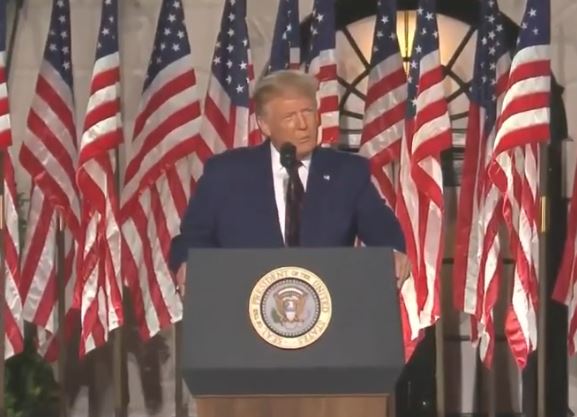The quadrennial Republican National Convention ended last evening on the south lawn of the White House with the nomination acceptance speech by President Donald Trump. The president outlined the stark contrasts on many policy issues between himself and the Democratic presidential nominee, former Vice President Joe Biden.
Among these sharp contrasts are energy and climate policies. President Trump stressed America’s energy independence and support for continued development of traditional fossil fuel sources.
By contrast, Mr. Biden last week, in his acceptance speech that concluded the Democratic National Convention, touched on his promise to “deal with climate change,” which he called a “crisis.” The details of his plans are provided in the Biden-Sanders Unity Task Force Recommendations.
The stagecraft for President Trump’s convention speech was unprecedented, and confirmed actor Michael Douglas’ line spoken in the 1995 film, The American President: “The White House is the single greatest home court advantage in the modern world.”
Coincidentally enough, this otherwise enjoyable film was a Rob Reiner-directed “global warming” propaganda exercise back when the alarmist camp was still using that label before it changed to the catch-all amorphous moniker, “climate change.” Another movie line, “Global warming is a calamity, the effects of which will be second only to nuclear war,” was uttered by film co-star Annette Bening’s crusading lobbyist character. This has not exactly panned out in the 25 years since, like so many such planetary assertions made in the 1990’s. Douglas, playing the president, smirks at the lobbyist’s oh-so-serious claim, obviously more interested in her than her legislative agenda.
But I digress. Back to the RNC.
President Trump’s speech was lengthy and detailed as he touched on a range of issues. He stuck to the script and avoided ad-libbing. Some commentators described his delivery as “flat.” I thought rather the president’s presentation was properly sober and serious, and consistent with his (debatable) claim of being “the most important election in the history of this country.” Certainly, this election is among the most important.
Elections, is it rightly claimed, are about the future, even though the determining factor for most voters is the record of the incumbent compared to his opponent.
On the energy front, in particular, President Trump boasted in his speech of securing “for the first time, American energy independence.” He recounted his administration’s approval of the Keystone XL and Dakota Access pipelines, and withdrawal from the “unfair and costly Paris Climate Accord.” This international treaty, which the Obama administration signed and committed the country without constitutionally mandated Senate approval, required the U.S. to reduce carbon emissions in an attempt to mitigate global warming. The folly and unfairness of this treaty is well documented by CFACT.
The president later contrasted his energy agenda with his opponent’s:
Biden has promised to abolish the production of American oil, coal, shale, and natural gas – laying waste to the economies of Pennsylvania, Ohio, Texas, North Dakota, Oklahoma, Colorado, and New Mexico. Millions of jobs will be lost, and energy prices will soar. These same policies led to crippling power outages in California just last week. How can Joe Biden claim to be an “ally of the Light” when his own party can’t even keep the lights on?
Interestingly, not once did the president mention Vice Presidential-nominee, Sen. Kamala Harris, Mr. Biden’s running mate. Instead, he presented Biden as a “Trojan Horse [for] wild-eyed Marxists like [Sen.] Bernie Sanders and his fellow radicals.” The Democratic Party establishment very much feared the nomination of Sen. Sanders, and successfully coalesced behind the former Vice President to win the nomination. President Trump last evening presented Sanders—a better known controversial figure than Sen. Harris—as Biden’s de facto running mate.
It is worth a reminder that while President Trump emphasizes continued fossil fuel development and energy independence, it is not as though the federal government will cease providing billions of dollars annually in funding and tax credits for renewable energy research and development; nor does he propose such. The U.S. Department of Energy and Environmental Protection Agency, among many other bureaucracies, are loaded with grants and initiatives for “green” and “renewable” energy, which will continue if there is a Trump second term.
With both political party conventions now concluded, it is clear that Donald Trump and Joe Biden offer very different directions for energy and climate policies. The American electorate will ultimately determine that direction, and we will live with the consequences of the election’s outcome.
